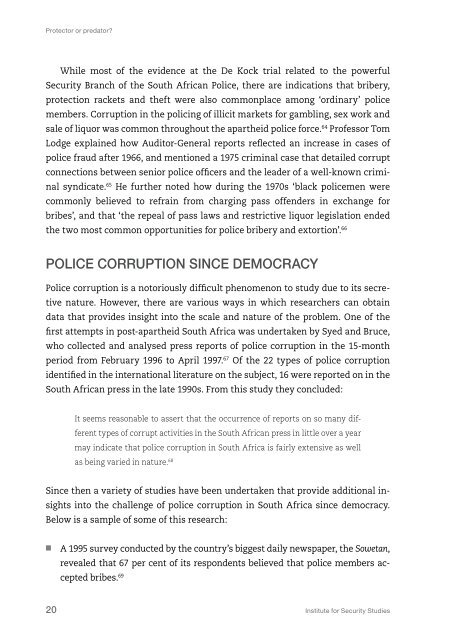Protector or predator? - Institute for Security Studies
Protector or predator? - Institute for Security Studies
Protector or predator? - Institute for Security Studies
You also want an ePaper? Increase the reach of your titles
YUMPU automatically turns print PDFs into web optimized ePapers that Google loves.
<strong>Protect<strong>or</strong></strong> <strong>or</strong> predat<strong>or</strong>?<br />
While most of the evidence at the De Kock trial related to the powerful<br />
<strong>Security</strong> Branch of the South African Police, there are indications that bribery,<br />
protection rackets and theft were also commonplace among ‘<strong>or</strong>dinary’ police<br />
members. C<strong>or</strong>ruption in the policing of illicit markets f<strong>or</strong> gambling, sex w<strong>or</strong>k and<br />
sale of liqu<strong>or</strong> was common throughout the apartheid police f<strong>or</strong>ce. 64 Profess<strong>or</strong> Tom<br />
Lodge explained how Audit<strong>or</strong>-General rep<strong>or</strong>ts reflected an increase in cases of<br />
police fraud after 1966, and mentioned a 1975 criminal case that detailed c<strong>or</strong>rupt<br />
connections between seni<strong>or</strong> police officers and the leader of a well-known criminal<br />
syndicate. 65 He further noted how during the 1970s ‘black policemen were<br />
commonly believed to refrain from charging pass offenders in exchange f<strong>or</strong><br />
bribes’, and that ‘the repeal of pass laws and restrictive liqu<strong>or</strong> legislation ended<br />
the two most common opp<strong>or</strong>tunities f<strong>or</strong> police bribery and ext<strong>or</strong>tion’. 66<br />
PoliCE c<strong>or</strong>rUPTiON siNCE democrACy<br />
Police c<strong>or</strong>ruption is a not<strong>or</strong>iously difficult phenomenon to study due to its secretive<br />
nature. However, there are various ways in which researchers can obtain<br />
data that provides insight into the scale and nature of the problem. One of the<br />
first attempts in post-apartheid South Africa was undertaken by Syed and Bruce,<br />
who collected and analysed press rep<strong>or</strong>ts of police c<strong>or</strong>ruption in the 15-month<br />
period from February 1996 to April 1997. 67 Of the 22 types of police c<strong>or</strong>ruption<br />
identified in the international literature on the subject, 16 were rep<strong>or</strong>ted on in the<br />
South African press in the late 1990s. From this study they concluded:<br />
It seems reasonable to assert that the occurrence of rep<strong>or</strong>ts on so many different<br />
types of c<strong>or</strong>rupt activities in the South African press in little over a year<br />
may indicate that police c<strong>or</strong>ruption in South Africa is fairly extensive as well<br />
as being varied in nature. 68<br />
Since then a variety of studies have been undertaken that provide additional insights<br />
into the challenge of police c<strong>or</strong>ruption in South Africa since democracy.<br />
Below is a sample of some of this research:<br />
■■<br />
A 1995 survey conducted by the country’s biggest daily newspaper, the Sowetan,<br />
revealed that 67 per cent of its respondents believed that police members accepted<br />
bribes. 69<br />
20<br />
<strong>Institute</strong> f<strong>or</strong> <strong>Security</strong> <strong>Studies</strong>

















